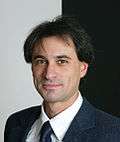Dario Floreano

Dario Floreano (San Daniele del Friuli, Italy, 1964) is director of the Laboratory of Intelligent Systems (LIS)[1] at the École Polytechnique Fédérale de Lausanne in Switzerland. He is one of the pioneers in evolutionary robotics, a research field in which robots are evolved using artificial evolution.
Floreano received an M.A. in visual psychophysics from the University of Trieste in 1988, an M.Sc. in neural computation from the University of Stirling in 1992, and a Ph.D. in cognitive systems and robotics from the University of Trieste in 1995
His research activities focus on three areas of embodied artificial intelligence: 1) design of novel micro-robots that take inspiration from biological organisms; 2) methods for allowing several of these robots to cooperate in order to accomplish missions that are impossible for a single robot; 3) artificial evolution to synthetize novel forms of electro-mechanical organisms and for reverse engineering of complex biological circuits, such as gene regulatory networks.
Floreano co-organized several international conferences in the fields of bio-mimetic engineering and is on the editorial board of several international journals: Neural Networks; Genetic Programming and Evolvable Machines; Adaptive Behavior; Artificial Life; Connection Science; Evolutionary Computation; IEEE Transactions on Evolutionary Computation; Autonomous Robots; Evolutionary Intelligence. He is cofounder and member of the Board of Directors of the International Society for Artificial Life, Inc., and a member of the Board of Governors of the International Society for Neural Networks.
He was also director of the popular podcast series Talking Robots,[2] which featured interviews with high-profile professionals in robotics and artificial intelligence for an inside view on the science, technology, and business of intelligent robotics.